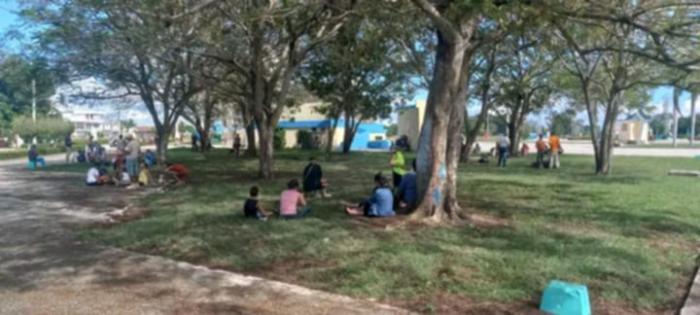
"From the National Defense Council we communicated with the first secretaries of the Party in Santiago de Cuba and Granma, provinces affected with the recent earthquakes. There have been landslides, damage to houses and power lines."
This was published in X by the President of the National Defense Council, Miguel Díaz-Canel Bermúdez, at the end of the meeting of the body that this Sunday, in addition to following up on the recovery of the damages caused by Hurricane Rafael, evaluated the actions in the face of the seismic activity that occurred in eastern Cuba.
"We ask our population in those areas to go out and stay in open places," he wrote about another natural phenomenon that again triggers alarms in Cuba: "We began to assess damages to begin recovery. The first and essential thing: to save lives."
At the meeting -which was also chaired by Political Bureau members Roberto Morales Ojeda, Secretary of Organizaton of the Party Central Committee; Army Corps General Álvaro López Miera, Hero of the Republic of Cuba and Minister of the Revolutionary Armed Forces (FAR); and Major General Lázaro Alberto Álvarez Casas-, the President indicated that residents in high-rise buildings should be guaranteed to come down; that health experts, communicators and psychologists should reach the areas most affected by the seismic activity; that where there is a significant number of concentrated population, the distribution of water and food should be ensured; that the communication of each event should flow to the Provincial Defense Council, from which, in turn, will flow the communication with the country's leadership; and that the damage should be evaluated in order to provide the necessary responses.
ON THE PROVINCES AFFECTED BY THE HURRICANE
From Artemisa, and accompanied by the Vice Prime Minister, Commander of the Revolution Ramiro Valdés Menéndez, the President of the Provincial Defense Council, Gladys Martínez Verdecia, informed that 245 people were protected.
Likewise, she said that more than 5,700 clients already had electricity; that 60 % of the population had access to fixed telephony, and 40 % to mobile telephony; while, regarding water supply, it reached 17 % of the clients.
"We can already see some progress," said Martínez Verdecia, who offered details on vital fronts such as the restoration of Public Health facilities, the distribution of food, or the work in agriculture, to which brigades are being incorporated to help in the recovery of the irrigation machines.
Among other information, he pointed out that 4,000 square meters of zinc roof tiles and 60 tons of cement will have arrived in the province shortly.
Regarding Mayabeque, it was learned that the electric power system had recovered to 77%, although the municipality of Quivicán was completely without the precious service.
Regarding the reestablishment of communications, the president of the Provincial Defense Council, Yuniasky Crespo Baquero, commented that, in spite of the efforts made, there is still not as much progress as desired. As for water supply, the situation is still complex.
President Díaz-Canel inquired about the sanitation work in the towns and municipalities, as well as about the progress of the work to reestablish the water service.
Regarding Havana, the country's leadership was able to learn that some 90 people remain sheltered in 11 institutions; that 850 houses were affected; and that about 90% of the circuits in the territory have electricity.
Although everything that has been done in these hours may seem to be something more than the everyday, Cuba has been able to see many faces of people who -said the Secretary of Organization, Roberto Morales Ojeda- "have done real feats."
When communicating indications related to what to do after the hurricane, the President of the National Defense Council reflected that now the most important thing is to conclude with the most complicated part of the sanitation; and that it is very important to focus on the issues of water and electricity, since there are people who have already been without those services for four days.
"I believe that a lot of work has been done in these days", said the dignitary, who emphasized to continue making efforts to mitigate, in the shortest possible time, the damages caused by the meteor.















